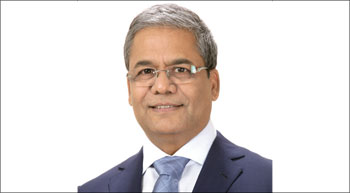Arun Lakhani, Chairman and Managing Director, Vishvaraj Infrastructure, says users will pay for drinking water if service providers improve service and engagement levels. Lakhani, whose firm has successfully rolled out the much-acclaimed ‘Nagpur 24×7 Water Supply Scheme’ in partnership with the French firm Veolia, also feels that the government needs to enunciate a policy on water reuse to make treated water an attractive proposition for the industry.
You always emphasise on ensuring people’s participation in conserving water. How was that achieved while you went about implementing the Orange City Water project in Nagpur?
This was basically aimed and achieved through proactive interaction with citizens. What we call as the ‘4P’ model, with the fourth ‘P’ being on-boarding of citizens. You communicate with them to clarify any questions that arise when a private player enters a sector like water. It is very essential that we remove all doubts about fairness of the proposal wherein everyone, irrespective of the social status, will be entitled to water. The model’s inclusiveness needs to be emphasised and communicated.
How satisfied are you with the success of the ‘My City, My Water’ campaign? Were there any significant challenges that you encountered during its rollout?
The ‘My City, My Water’ campaign was primarily aimed at schoolchildren, to catch them young. And once they become aware about the water situation in their town, the types of wastage we are incurring, and the steps that the municipal corporation is taking to address them, they become our emissaries.
I have had several experiences where my friends’ children asked them to close the tap while shaving or brushing!
The idea is to create these young brand ambassadors and also, of course, to visit localities for meetings. It was a very welcome move, because it made everyone conscious about water’s importance as the lifeline. It was all about reigniting that consciousness that everyone carries inside about the safety and security of water.
Smart Water Management is another area that you are working on. Tell us something more about your initiative to reuse treated sewage in power generation…
It’s a no brainer per se. If you are supplying 1,000 million litres of water to a town, 800 million litres comes back as sewage. Now this sewage contaminates your freshwater sources. If you treat this sewage, it can be used for industrial purposes. If we replace freshwater, industries, particularly thermal power stations, will use treated water, and we are creating 800 million litres of new water. It is perfectly alright for industry to use this treated water rather than freshwater, which is required more for drinking purposes. Closing the loop in this whole cycle makes it very attractive with multiple benefits.
How intrinsic is that theme to the government’s Smart Cities Mission?
The government is quite aware and has taken sewage and water treatment as priority in the Smart Cities programme. (We need) healthy and clean water for drinking purposes and a sewage system that takes care of waste so that we are able to reduce the load on freshwater; these are basic requirements. Being smart is the second step.
In your view, which funding model works best in water and wastewater management?
It can be annuity or the Hybrid Annuity Model (HAM) or public-private partnership (PPP) model. These days the trend is more towards HAM, which is very successful in the roads and highways sector. The responsibility for risk and funding is jointly shared by the government and private players.
In my view, for wastewater, annuity or HAM is better. For drinking water – owing to the social nature of the project – EPC management contracts, plus 15 years of operations and maintenance (O&M), as is being done in Karnataka or in projects being undertaken with Asian Development Bank (ADB) funding in various other states, are preferable.
Pilferage of drinking water and rainwater harvesting continue to be two challenging areas in India. What is your stand on those two key fronts?
I think pilferage of drinking water is driven more by habit than economics. If you are required to pay Rs150 to Rs 200 a month for water, I don’t see a person living in an urban area unwilling to do that. He probably spends that much buying two to three litres of petrol. As such, the value being charged from citizens of a town, including the economically weaker sections, for water, is negligible. However, it is the habit that we feel should not be compensated for.
Users do pay if you provide better service and engage more. We have had this experience in Nagpur. On the reuse of water, definitely there should be a government policy that promotes reuse. Industrial water needs to be priced in such a way that buying treated water becomes more attractive. Without such a policy in place, it will be difficult for industry to justify buying treated water in lieu of cheaper freshwater.
What is the status of your plans to raise $100 million to further enhance Vishvaraj’s water supply, sewage treatment and road construction portfolio?
We are in discussions with some interested entities and will close this in financial year 2017-18. Since we are doing well in our existing portfolio of projects, we will need this additional push when we win more projects this year.
I would not like to disclose any names at this stage.
– MANISH PANT



Leave a Reply
You must be logged in to post a comment.